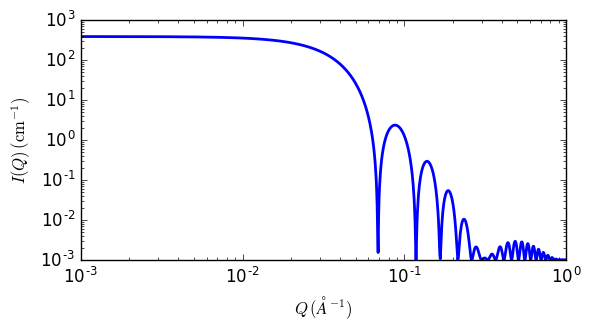core_shell_sphere
Form factor for a monodisperse spherical particle with particle with a core-shell structure.
| Parameter | Description | Units | Default value |
|---|---|---|---|
| scale | Source intensity | None | 1 |
| background | Source background | cm-1 | 0.001 |
| radius | Sphere core radius | Å | 60 |
| thickness | Sphere shell thickness | Å | 10 |
| sld_core | core scattering length density | 10-6Å-2 | 1 |
| sld_shell | shell scattering length density | 10-6Å-2 | 2 |
| sld_solvent | Solvent scattering length density | 10-6Å-2 | 3 |
The returned value is scaled to units of cm-1 sr-1, absolute scale.
This model provides the form factor, \(P(q)\), for a spherical particle with a core-shell structure. The form factor is normalized by the particle volume.
For information about polarised and magnetic scattering, see the Polarisation/Magnetic Scattering documentation.
Definition
The 1D scattering intensity is calculated in the following way (Guinier, 1955)
where
where \(V_s\) is the volume of the whole particle, \(V_c\) is the volume of the core, \(r_s\) = \(radius\) + \(thickness\) is the radius of the particle, \(r_c\) is the radius of the core, \(\rho_c\) is the scattering length density of the core, \(\rho_s\) is the scattering length density of the shell, \(\rho_\text{solv}\), is the scattering length density of the solvent.
The 2D scattering intensity is the same as \(P(q)\) above, regardless of the orientation of the \(q\) vector.
NB: The outer most radius (ie, = radius + thickness) is used as the effective radius for \(S(Q)\) when \(P(Q) \cdot S(Q)\) is applied.

Fig. 66 1D plot corresponding to the default parameters of the model.
References
A Guinier and G Fournet, Small-Angle Scattering of X-Rays, John Wiley and Sons, New York, (1955)
Validation
Validation of our code was done by comparing the output of the 1D model to the output of the software provided by NIST (Kline, 2006). Figure 1 shows a comparison of the output of our model and the output of the NIST software.